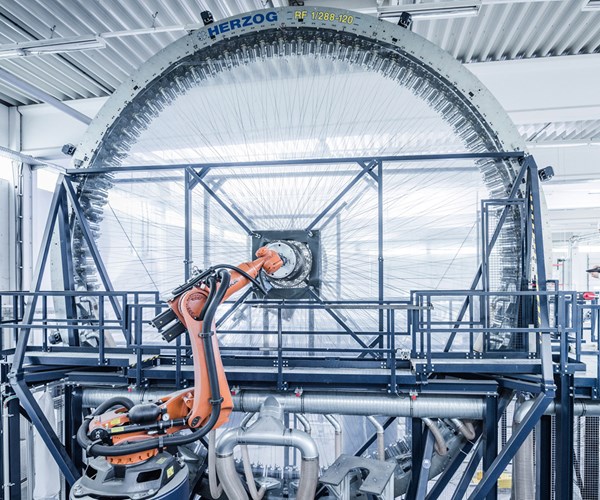Porsche and the braided carbon fiber wheel
For just €15,232, you can get a set of four braided carbon fiber wheels on your 2018 Porsche 911 S. This will be the first time a carmaker has offered braided carbon fiber in such an application.

Porsche has revealed, with some fanfare, that it is the first automotive OEM to offer a vehicle with braided carbon fiber wheels. The 911 Turbo S is the car, and as the video below shows, its wheels are definitely made braided carbon fiber.
All together, the four wheels weigh around 8.5 kg less than standard alloy wheels, which is a weight savings of 20%. They are also, says Porsche, 20% stronger. With a reduced unsprung weight, the tires trail the surface of the road better and are optimized for absorbing longitudinal and lateral forces. Lower rotating masses mean more spontaneity both in acceleration and braking. The result is increased driving dynamics and driving pleasure.
The wheel’s spokes are made with 200 individual carbon fiber plies. The second component is the rim base made from carbon fiber on a Herzog 9m diameter braider, which the carmaker says, in the video, is the largest such braider in the world. (Indeed, this is a large braider, but it is not the world’s largest). Porsche says the wheel center is then braided into the rim base, prior to infusion.

Herzog 9m braider.
Porsche says braiding makes the structure of the carbon fiber components denser and more compact, which increases rigidity. Using the material more efficiently also produces less waste.
The wheels will be available as an option for the 911 Turbo S Exclusive Series in the dimensions of 9 J x 20 for the front axle and 11.5 J x 20 for the rear axle. In Germany, a set of four wheels will set you back €15,232, including VAT.
Related Content
-
Otto Aviation launches Phantom 3500 business jet with all-composite airframe from Leonardo
Promising 60% less fuel burn and 90% less emissions using SAF, the super-laminar flow design with windowless fuselage will be built using RTM in Florida facility with certification slated for 2030.
-
Infinite Composites: Type V tanks for space, hydrogen, automotive and more
After a decade of proving its linerless, weight-saving composite tanks with NASA and more than 30 aerospace companies, this CryoSphere pioneer is scaling for growth in commercial space and sustainable transportation on Earth.
-
Welding is not bonding
Discussion of the issues in our understanding of thermoplastic composite welded structures and certification of the latest materials and welding technologies for future airframes.






